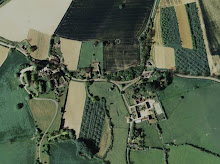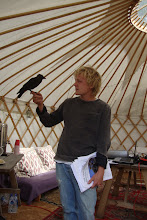Today I was in the 1940s orchard clearing brambles away from the fearsomely shrouded branches of tree 40. I found a surprisingly active colony of honey bees in the south facing base of one of the trees nearby. Honey bees are not actually native to Britain. There are 'feral' populations of the European honey bee, a domesticated form of the bee Apis mellifera that originated in eastern tropical Africa. Beekeepers and orchards have a long history of symbiosis, with the beehives traditionally brought into the orchard in late spring for the blossom. This way the pollination of the blossom is maximised, helping ensure a good apple crop for the farmer and lots of nectar for the bees to make honey with.

I remember that the cavity had had unoccupied combs in it last winter and has clearly been repossessed by the bees. The photo on the left shows this comb in November 2008, with the one on the right taken today. Honey bees are not doing well in Britain currently. They are suffering from a range of new diseases, including the parasitic varroa mite that has spread viruses throughout wild and captive bee colonies.

The press often deal with these issues rather clumsily, confusing the causes of the decline in feral honey bee populations with those of the truly native bumblebee (23 species) and solitary bee (~250 species). The basic reason for the decline in most of our true native bee species has little to do with diseases- agricultural intensification has removed the majority of our species-rich grasslands and thus there are no longer enough nectar-rich plants to support bumblebee colonies and solitary bees (this photo shows a unimproved lowland flood meadow near Bledington, with abundant clover and birdsfoot trefoil). A lack of appropriate nest site habitats is also probably a factor limiting some bumblebee and solitary bee species. I went on a bumblebee walk on Salisbury Plain in August and met Damian who is interested in all these issues and has his own charity dedicated to helping bees.



Another bee charity you might be interested in is the Global Bee Project, based in Stroud. They give people simple tips on how to support wild bees.
ReplyDeleteI like your blog a lot - the pictures are fantastic. Have a look at mine: jamesrussellontheweb.blogspot.com. If you rummage through the archives you'll find an excerpt from 'Manmade Eden', a history of traditional orchards that I wrote a couple of years ago. I'm fascinated by orchards and am now researching 'The Naked Guide to Cider', which is a quirky and encyclopediac book about cider and the culture surrounding it. I shall refer to your site when I write the section about orchards and wildlife.
Have you come across Days Cottage? They make apple juice, cider and perry near Gloucester, and have a new Orchard Skills centre. Dave Kaspar does a lot of work for the Gloucestershire Orchard Group.